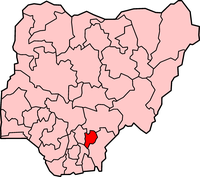Ebonyi State is domiciled in the SouthEast geopolitical zone of Nigeria and is dominated by members of the Igbo tribe. The most widely spoken languages in Ebonyi include the Igbo and the English languages. With an estimated population of 2, 173, 509 inhabitants, Ebonyi state also boasts 13 Local government areas which include Abakaliki, Afikpo North, Afikpo south, Ebonyi, Ezza North, Ezza South, Ikwo, Ishielu, Ivo, Izzi, Ohaozara, Ohaukwu, and Onicha with Abakaliki doubling as both the state’s largest town and capital. A number of Tertiary Institutions are found in Ebonyi state and these include the Akanu Ibiam Federal Polytechnic Unwana, Federal School of Agriculture Ishiagu, Ebonyi state College of Education Ikwo, Ebonyi state University Abakaliki, and the Alex Ekwueme Federal University Ndufu Alike Ikwo. The health sector in Ebonyi state is characterized by the presence of several privately and governmnent owned hospitals which include the Federal Teaching Hospital Abakaliki,General hospital Onueke, Federal Medical Center Abakaliki, Miserdicodiae Hospital Afikpo, Christ the King Hospital Abakaliki, the Ebonyi state University Teaching Hospital Abakaliki,and the St. Theresa's Hospital Abakaliki.
Other prominent towns in Ebonyi include Afikpo, Onueke and Onicha. The most widely practiced religion in Ebonyi state is Christianity with an estimated 98 percent of the state’s inhabitants registered as nominal or practicing Christians. Ebonyi state has a very rich cultural heritage manifested in different cultural festivals which include the Okumpo masquerade festival, the Oke Aku festival of the Ezza, Ikeji festival in Afikpo, Nkwa Umuagbogho festival, Mgba Okposi festival, Okpontu Ulogo masquerade festival, and the New Yam festival.
Popular landmarks in Ebonyi state include the Abakaliki township stadium and the Federal University Ikwo.
The Governor of Ebonyi State is Dave Umahi.
Salt of the Nation
Ebonyi state has a total area of 5,533 km squared with a topography characterized by flat and arable lands. Annual precipitation averages at about 2,500 mm per annum with an average annual temperature of 29 degrees centigrade. Ebonyi state witnesses two distinct seasons which are the dry and the rainy seasons; the dry seasons in the state are usually experienced between the months of November to March while the rainy seasons usually come between April to October. There is usaully a brief harmattan season that is experienced between the months of December and January.
Ebonyi state is majorly an Agrarian state with a majority of the state’s inhabitants engaging in subsistence and commercial agriculture. Prominent among the crops grown in Ebonyi state are rice, cassava, yam and maize. Also, Ebonyi state has enormous salt deposits in the ubotu and okposi salt lakes. Trade features prominently on the list of occupations undertaken by the dwellers of Ebonyi state and the state has several markets which include the Ebonyi state International market Abakaliki, Eke Imoha market, Abakaliki main market, Kpirikpiri market, Nkwo Jakki market in Ezzamgbo, Eke market in Afikpo North, New market Abakaliki, and the Abakpa main market Abakaliki.
Besides the massive salt deposits in Ebonyi state, other mineral resources found within its territory include limestone, lead, zinc, marble, clay, granite, and gypsum.
Ebonyi state was created in 1996 from parts of Enugu and Abia states under the administration of the late Gen. Sani Abacha. Walter Feghabo was the State’s pioneer administrator and he superintended over the state’s affairs between October 1996 and august 1998.
The full list of governors/ administrators of Ebonyi state since creation is provided below;
Walter Feghabo - 1996-1998
Simeon Oduoye - 1998- 1999
Sam Egwu - 1999- 2007.
Martin Elechi - 2007- 2015
Dave Umahi - 2015 - date.
4 based on 0 reviews

Find and explore some of the best businesses in Ebonyi State.
© 2025 Manpower Nigeria. All rights reserved.